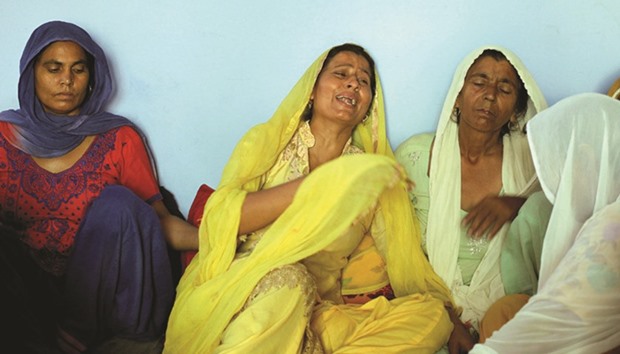Prime Minister Narendra Modi yesterday summoned top security advisers to thrash out a response to a deadly raid on a Kashmir army base blamed on militants from Pakistan, amid calls for tough action.
Modi has vowed to punish those behind the attack in which gunmen hurling grenades stormed the base in Uri at 5.30am on Sunday, killing 17 soldiers in the worst such attack in over a decade.
An 18th soldier died in hospital yesterday.
The prime minister promised during his election campaign to take a hard line over Kashmir and has faced calls from army veterans and even some in his own Bharatiya Janata Party for military action against Pakistan.
Yesterday he summoned his national security advisers and military leaders to formulate a response, which media reports said could include air strikes on training camps on the Pakistan side of the Line of Control (LoC).
But security experts say India lacks the military capabilities to take on its neighbour.
“It’s not like the US conducting air strikes in Syria to tackle IS that’s hundreds of miles away from home ground, Pakistan is next door,” said Ajai Sahni, executive director at the Institute of Conflict Management think-tank in Delhi.
“India knows it can’t sustain a 15-day war against Pakistan and Pakistan knows it can’t sustain a similar war against India.”
Local media also urged caution, with the Indian Express saying calls for military action were “easier made than acted upon.”
On Sunday Home Minister Rajnath Singh accused Pakistan of “continued and direct support to terrorism and terrorist groups” and called for it to be internationally isolated.
Sunday’s attack followed weeks of protests sparked by the killing of rebel leader Burhan Wani in a gunfight with security forces.
At least 87 civilians have been killed and thousands injured in clashes between protesters and security forces, the worst unrest to hit Kashmir since 2010.
Yesterday more than 50 people were injured when security forces fired tear gas and pellet guns at protesters who defied a curfew in southern Kashmir, according to local police.
Sunday’s attack was one of the bloodiest on soldiers since an armed rebellion against Indian rule erupted in 1989.
Militants killed 30 soldiers and their families in a suicide attack in Kaluchak in 2002.
Yesterday soldiers paid tribute to their colleagues, most of whom died when their tents and other accommodation caught fire, at a wreath-laying ceremony in Srinagar.
The army’s director-general of military operations Ranbir Singh has blamed Pakistan-based Jaish-e-Mohamed group, which was implicated in an audacious attack on an Indian Air Force base in Pathankot in Punjab in January that left seven soldiers dead.
That attack dashed hopes of a revival of peace talks, which have been on ice ever since.
“Our first priority is to fortify every defence base and it is shocking that one of our strategic locations was hit,” a senior Modi aide said. “It has exposed the flaws and the weakness of our security infrastructure and an immediate overhaul is the first job on hand.”
Indian troops searched three ravines that cut across the border in mountainous terrain near Uri, which a senior army official said they believe the militants sneaked across.
Reinforcements were also sent to patrol one of the world’s most heavily militarised frontiers, where Indian and Pakistani forces in places stand eyeball to eyeball and sometimes exchange fire, the army official said.
A weekly bus service between Srinagar and Muzaffarabad operated as normal yesterday however.
The bus passed through Uri and passengers waited at the LoC border ready to cross.
The United States, the United Kingdom and France have all condemned the attack and said they stand with India in its fight against “terrorism.”

Geeta (in yellow), wife of Ravi Paul, a soldier who was killed in Sunday’s attack at an army base in Uri, mourns at her house in Sarwa village in Samba district, south of Jammu, yesterday.
